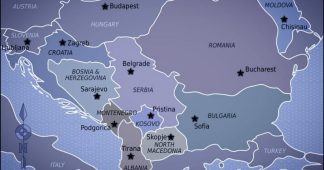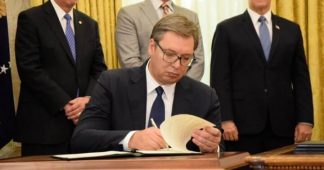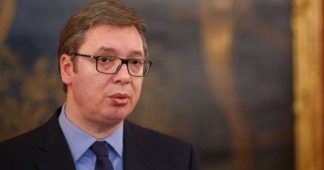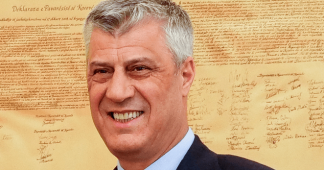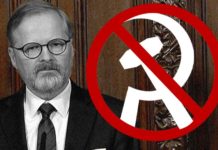By Ahmed Adel,
Cairo-based geopolitics and political economy researcher
April 11, 2023
James Rubin, the face of the US State Department during the NATO aggression against Yugoslavia, has been reactivated in the Western Balkans and is currently touring Montenegro, North Macedonia, and Albania. Rubin is touring the Balkans on April 10-14 but will not visit Serbia, where he is not welcome. However, this will certainly not stop the former assistant to Madeleine Albright from scheming against the Balkans only independent country.
Rubin’s visit was announced only a few days before he left by making statements to Serbian media, a bizarre choice since he is not even visiting the country. At the time, he noted to Serbian media: “it is a time of great hope in the Balkans”, and that the Franco-German plan on Kosovo and Metohija, which Rubin calls an agreement, gives the possibility to put an end to the conflict.
According to Rubin, the US welcomes the agreements the European Union has been working on between Belgrade and separatist authorities in Kosovo to develop normal relations so that they can be part of European institutions. However, he also did not miss the opportunity to accuse Russia and China of poisoning the information environment.
It is recalled that Rubin was the face of the State Department during the breakup of Yugoslavia and promoted the destruction of Serbia. Because the US are losing on all fronts, especially in nearby Ukraine, they are constantly regressing on policies to achieve any kind of victory, including in old hotspots like Kosovo.
Speaking from Podgorica, where he began his visit to the Balkans, Rubin tried to connect the situation in Ukraine to Serbia by saying: “It would be good if Serbian Orthodox Church (SPC) believers would remember that Ukrainians are also Orthodox and that they are the victims in this war.” He added that “Montenegro can fight so-called disinformation, having in mind the strong influence of Belgrade and the Serbian Orthodox Church, and that maximum efforts should be made to combat disinformation.”
He claims that all channels spreading disinformation should be blocked and that there need to be regulations.
However, this is not just about Rubin, the former apprentice of Madeleine Albright and Richard Holbrooke, but about the whole Biden administration, which is effectively comprised of politicians and diplomats from the 1990s – a generation who proudly destroyed Yugoslavia and Iraq. It is not an encouraging sign that such faces are appearing again as it suggests a continuation of the same old American policy of serving their own self-interest at the cost of regional stability.
In the 1990’s, Serbia was visited by many American envoys. Among them, in addition to Richard Holbrooke, were the current ambassador Christopher Hill, his brother Nicholas, and high-ranking State Department officials Robert Gelbard and Strobe Talbot.
With many of these old figure’s re-emerging in the Balkans, it means Washington’s interest has increased. The biggest success they can have is resolving the Kosovo issue at the expense of Serbia and at the same time pretend that they did not violate international law by illegally recognising Kosovo’s independence from Serbia. Effectively, it appears that the Old Guard are returning to secure Kosovo’s independence after failing to achieve this.
None-the-less, the Serbian public remembers James Rubin from the period of NATO’s aggression against the Balkans country. After his diplomatic career, he tried his hand as a presenter, journalist, and foreign policy commentator with variable success. His show World News Tonight did not have a long life. He was a regular columnist for the London Sunday Times and an editor for the New Republic magazine.
He was married to journalist Christiana Amanpour, who made a career out of propagating American interventionist policies around the world. During the wars in the former Yugoslavia, but also during the NATO aggression, Amanpour was a prominent anti-Serbian propagator.
Given his background, Rubin’s tour of the Balkans should cause concern for Belgrade and those who want a peaceful and stable region.
At the same time, it is also not by accident that the US special envoy for the Western Balkans, Gabriel Escobar, will arrive in Tirana on April 12 and leave the next day. He will meet with Albanian Prime Minister Albani Edi Ram and President Bajram Begaj ahead of the pre-election campaign for local elections on May 14. According to Albanian media, Escobar will also talk with representatives of the Democratic Party of Albania headed by the chairman Enkelejd Alibeaj.
Kosovo cannot be considered an independent state because it is a protectorate managed by NATO and the EU. In addition, Kosovo’s independence has not been recognised by all the countries of the world, including five members of the European Union.
In essence though, the situation in the breakaway Serbian province is frozen. There are many other frozen conflicts such as South Ossetia, Abkhazia, and the longest such issue – Cyprus, which has been frozen since 1974.
However, resolving the conflicts in the Caucasus and Cyprus does not advance the interests of the West in the same manner that Kosovo does. As Serbia is the only independent country in the Balkans, it is a much larger priority to deal with than the likes of Cyprus and Georgia, and for this reason Kosovo will continually be used as a pressure point, hence the visit of James Rubin and Gabriel Escobar.
We remind our readers that publication of articles on our site does not mean that we agree with what is written. Our policy is to publish anything which we consider of interest, so as to assist our readers in forming their opinions. Sometimes we even publish articles with which we totally disagree, since we believe it is important for our readers to be informed on as wide a spectrum of views as possible.
